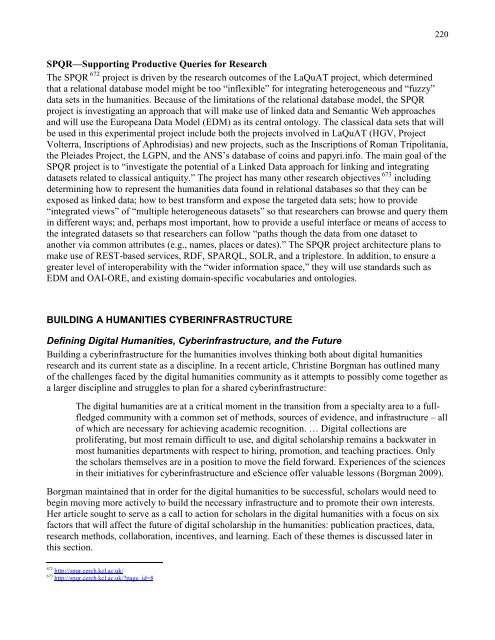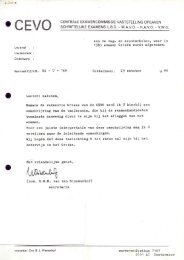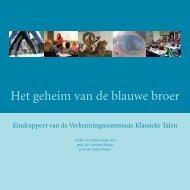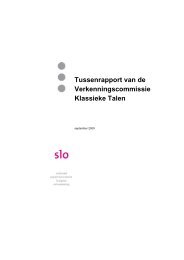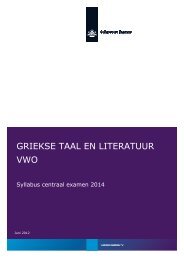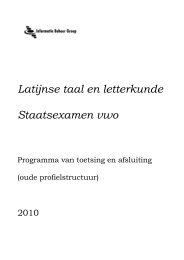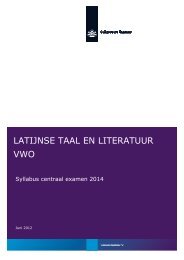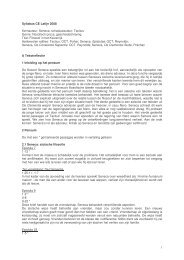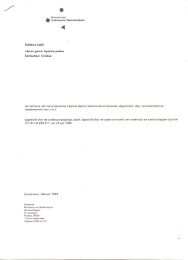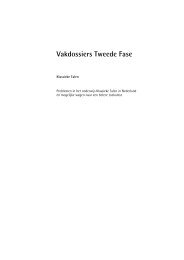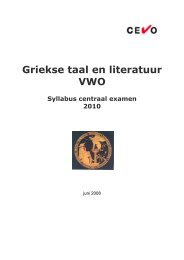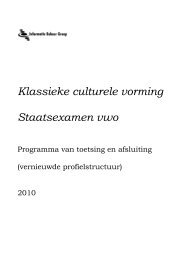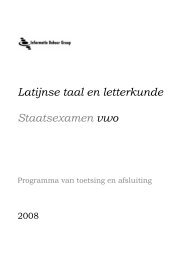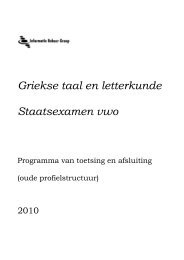Rome Wasn't Digitized in a Day - Council on Library and Information ...
Rome Wasn't Digitized in a Day - Council on Library and Information ...
Rome Wasn't Digitized in a Day - Council on Library and Information ...
Create successful ePaper yourself
Turn your PDF publications into a flip-book with our unique Google optimized e-Paper software.
220<br />
SPQR—Support<str<strong>on</strong>g>in</str<strong>on</strong>g>g Productive Queries for Research<br />
The SPQR 672 project is driven by the research outcomes of the LaQuAT project, which determ<str<strong>on</strong>g>in</str<strong>on</strong>g>ed<br />
that a relati<strong>on</strong>al database model might be too “<str<strong>on</strong>g>in</str<strong>on</strong>g>flexible” for <str<strong>on</strong>g>in</str<strong>on</strong>g>tegrat<str<strong>on</strong>g>in</str<strong>on</strong>g>g heterogeneous <strong>and</strong> “fuzzy”<br />
data sets <str<strong>on</strong>g>in</str<strong>on</strong>g> the humanities. Because of the limitati<strong>on</strong>s of the relati<strong>on</strong>al database model, the SPQR<br />
project is <str<strong>on</strong>g>in</str<strong>on</strong>g>vestigat<str<strong>on</strong>g>in</str<strong>on</strong>g>g an approach that will make use of l<str<strong>on</strong>g>in</str<strong>on</strong>g>ked data <strong>and</strong> Semantic Web approaches<br />
<strong>and</strong> will use the Europeana Data Model (EDM) as its central <strong>on</strong>tology. The classical data sets that will<br />
be used <str<strong>on</strong>g>in</str<strong>on</strong>g> this experimental project <str<strong>on</strong>g>in</str<strong>on</strong>g>clude both the projects <str<strong>on</strong>g>in</str<strong>on</strong>g>volved <str<strong>on</strong>g>in</str<strong>on</strong>g> LaQuAT (HGV, Project<br />
Volterra, Inscripti<strong>on</strong>s of Aphrodisias) <strong>and</strong> new projects, such as the Inscripti<strong>on</strong>s of Roman Tripolitania,<br />
the Pleiades Project, the LGPN, <strong>and</strong> the ANS’s database of co<str<strong>on</strong>g>in</str<strong>on</strong>g>s <strong>and</strong> papyri.<str<strong>on</strong>g>in</str<strong>on</strong>g>fo. The ma<str<strong>on</strong>g>in</str<strong>on</strong>g> goal of the<br />
SPQR project is to “<str<strong>on</strong>g>in</str<strong>on</strong>g>vestigate the potential of a L<str<strong>on</strong>g>in</str<strong>on</strong>g>ked Data approach for l<str<strong>on</strong>g>in</str<strong>on</strong>g>k<str<strong>on</strong>g>in</str<strong>on</strong>g>g <strong>and</strong> <str<strong>on</strong>g>in</str<strong>on</strong>g>tegrat<str<strong>on</strong>g>in</str<strong>on</strong>g>g<br />
datasets related to classical antiquity.” The project has many other research objectives 673 <str<strong>on</strong>g>in</str<strong>on</strong>g>clud<str<strong>on</strong>g>in</str<strong>on</strong>g>g<br />
determ<str<strong>on</strong>g>in</str<strong>on</strong>g><str<strong>on</strong>g>in</str<strong>on</strong>g>g how to represent the humanities data found <str<strong>on</strong>g>in</str<strong>on</strong>g> relati<strong>on</strong>al databases so that they can be<br />
exposed as l<str<strong>on</strong>g>in</str<strong>on</strong>g>ked data; how to best transform <strong>and</strong> expose the targeted data sets; how to provide<br />
“<str<strong>on</strong>g>in</str<strong>on</strong>g>tegrated views” of “multiple heterogeneous datasets” so that researchers can browse <strong>and</strong> query them<br />
<str<strong>on</strong>g>in</str<strong>on</strong>g> different ways; <strong>and</strong>, perhaps most important, how to provide a useful <str<strong>on</strong>g>in</str<strong>on</strong>g>terface or means of access to<br />
the <str<strong>on</strong>g>in</str<strong>on</strong>g>tegrated datasets so that researchers can follow “paths though the data from <strong>on</strong>e dataset to<br />
another via comm<strong>on</strong> attributes (e.g., names, places or dates).” The SPQR project architecture plans to<br />
make use of REST-based services, RDF, SPARQL, SOLR, <strong>and</strong> a triplestore. In additi<strong>on</strong>, to ensure a<br />
greater level of <str<strong>on</strong>g>in</str<strong>on</strong>g>teroperability with the “wider <str<strong>on</strong>g>in</str<strong>on</strong>g>formati<strong>on</strong> space,” they will use st<strong>and</strong>ards such as<br />
EDM <strong>and</strong> OAI-ORE, <strong>and</strong> exist<str<strong>on</strong>g>in</str<strong>on</strong>g>g doma<str<strong>on</strong>g>in</str<strong>on</strong>g>-specific vocabularies <strong>and</strong> <strong>on</strong>tologies.<br />
BUILDING A HUMANITIES CYBERINFRASTRUCTURE<br />
Def<str<strong>on</strong>g>in</str<strong>on</strong>g><str<strong>on</strong>g>in</str<strong>on</strong>g>g Digital Humanities, Cyber<str<strong>on</strong>g>in</str<strong>on</strong>g>frastructure, <strong>and</strong> the Future<br />
Build<str<strong>on</strong>g>in</str<strong>on</strong>g>g a cyber<str<strong>on</strong>g>in</str<strong>on</strong>g>frastructure for the humanities <str<strong>on</strong>g>in</str<strong>on</strong>g>volves th<str<strong>on</strong>g>in</str<strong>on</strong>g>k<str<strong>on</strong>g>in</str<strong>on</strong>g>g both about digital humanities<br />
research <strong>and</strong> its current state as a discipl<str<strong>on</strong>g>in</str<strong>on</strong>g>e. In a recent article, Christ<str<strong>on</strong>g>in</str<strong>on</strong>g>e Borgman has outl<str<strong>on</strong>g>in</str<strong>on</strong>g>ed many<br />
of the challenges faced by the digital humanities community as it attempts to possibly come together as<br />
a larger discipl<str<strong>on</strong>g>in</str<strong>on</strong>g>e <strong>and</strong> struggles to plan for a shared cyber<str<strong>on</strong>g>in</str<strong>on</strong>g>frastructure:<br />
The digital humanities are at a critical moment <str<strong>on</strong>g>in</str<strong>on</strong>g> the transiti<strong>on</strong> from a specialty area to a fullfledged<br />
community with a comm<strong>on</strong> set of methods, sources of evidence, <strong>and</strong> <str<strong>on</strong>g>in</str<strong>on</strong>g>frastructure – all<br />
of which are necessary for achiev<str<strong>on</strong>g>in</str<strong>on</strong>g>g academic recogniti<strong>on</strong>. … Digital collecti<strong>on</strong>s are<br />
proliferat<str<strong>on</strong>g>in</str<strong>on</strong>g>g, but most rema<str<strong>on</strong>g>in</str<strong>on</strong>g> difficult to use, <strong>and</strong> digital scholarship rema<str<strong>on</strong>g>in</str<strong>on</strong>g>s a backwater <str<strong>on</strong>g>in</str<strong>on</strong>g><br />
most humanities departments with respect to hir<str<strong>on</strong>g>in</str<strong>on</strong>g>g, promoti<strong>on</strong>, <strong>and</strong> teach<str<strong>on</strong>g>in</str<strong>on</strong>g>g practices. Only<br />
the scholars themselves are <str<strong>on</strong>g>in</str<strong>on</strong>g> a positi<strong>on</strong> to move the field forward. Experiences of the sciences<br />
<str<strong>on</strong>g>in</str<strong>on</strong>g> their <str<strong>on</strong>g>in</str<strong>on</strong>g>itiatives for cyber<str<strong>on</strong>g>in</str<strong>on</strong>g>frastructure <strong>and</strong> eScience offer valuable less<strong>on</strong>s (Borgman 2009).<br />
Borgman ma<str<strong>on</strong>g>in</str<strong>on</strong>g>ta<str<strong>on</strong>g>in</str<strong>on</strong>g>ed that <str<strong>on</strong>g>in</str<strong>on</strong>g> order for the digital humanities to be successful, scholars would need to<br />
beg<str<strong>on</strong>g>in</str<strong>on</strong>g> mov<str<strong>on</strong>g>in</str<strong>on</strong>g>g more actively to build the necessary <str<strong>on</strong>g>in</str<strong>on</strong>g>frastructure <strong>and</strong> to promote their own <str<strong>on</strong>g>in</str<strong>on</strong>g>terests.<br />
Her article sought to serve as a call to acti<strong>on</strong> for scholars <str<strong>on</strong>g>in</str<strong>on</strong>g> the digital humanities with a focus <strong>on</strong> six<br />
factors that will affect the future of digital scholarship <str<strong>on</strong>g>in</str<strong>on</strong>g> the humanities: publicati<strong>on</strong> practices, data,<br />
research methods, collaborati<strong>on</strong>, <str<strong>on</strong>g>in</str<strong>on</strong>g>centives, <strong>and</strong> learn<str<strong>on</strong>g>in</str<strong>on</strong>g>g. Each of these themes is discussed later <str<strong>on</strong>g>in</str<strong>on</strong>g><br />
this secti<strong>on</strong>.<br />
672 http://spqr.cerch.kcl.ac.uk/<br />
673 http://spqr.cerch.kcl.ac.uk/page_id=8


